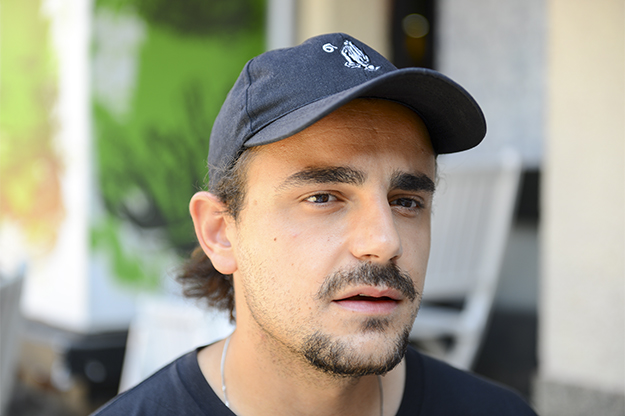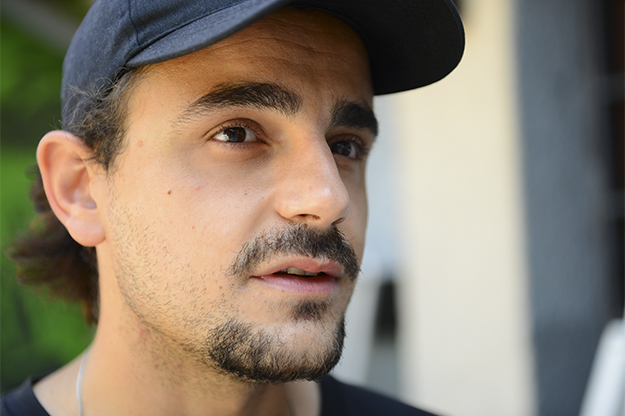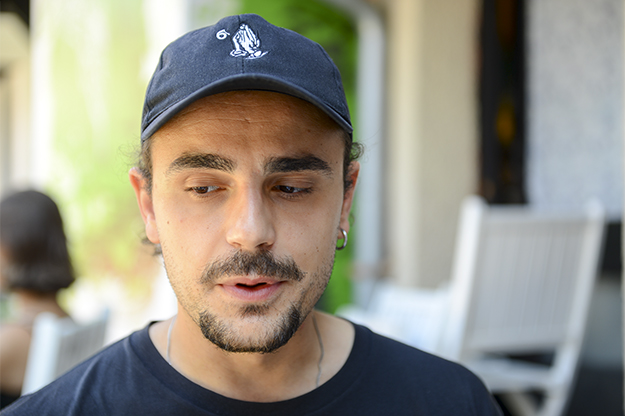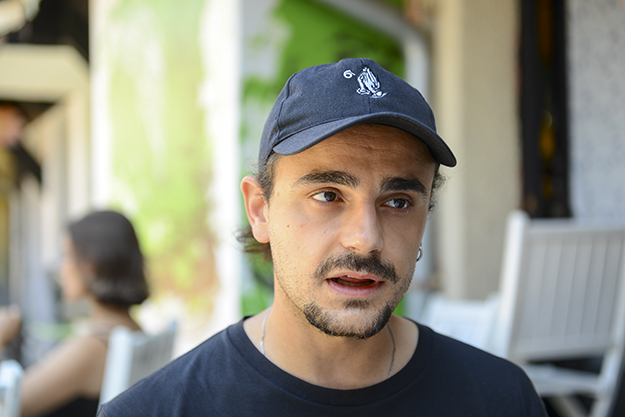When talking about Kosovo, one cannot avoid the massive diaspora community living overseas. Kosovars are dispersed.
Stereotypes have developed both in Kosovo and abroad about the diaspora: BMWs, traffic jams in the summer and occasional presents from the ‘shacis.’ However, little is known on the process people undergo in their home yet foreign country; of being Albanian in Switzerland but Swiss in Kosovo. Having two ‘sources’ of nationality can be a gift but also a burden.
In his feature documentary “Zvicra,” Fisnik Maxhuni shows how thinking patterns in diaspora communities repeat themselves over and over again: ‘Am I Albanian or Swiss? Can I be both?’ In his own search for identity, Maxhuni has decided to make this inner struggle documented on film.
Born in 1989 in Kosovo, Maxhuni remained stateless until 2005, when he finally acquired Swiss citizenship. As an immigrant child he feels that he has had to work ten-times harder to reach out to the world, but has since completed studies in Geneva and London, served as a diplomatic assistant at the Swiss Embassy in Tokyo, as well as spending time in Indonesia and Bolivia.
Maxhuni appeared at this year’s DokuFest at a special screening of “Zvicra” which was followed by a discussion with the packed out audience. K2.0 caught up with him the next day to discuss the issues tackled in the film further.
K2.0: Why were you interested in reflecting on the topic of dual nationality and identity formation?
Fisnik Maxhuni: It is a very simple and important question. First of all, I was born in Kosovo and grew up here until the age of 4. Then I moved to Switzerland. So basically in my early years in Switzerland, I had to try to understand what I was going through — becoming Swiss.
Because I was a kid it was easier, but at the same time I had to build my own identity based on a couple of souvenirs and memories I had. It was mostly built on what my parents were reflecting, the identity that they have, and the one they wanted to transmit to me.
The question of dual identity is very personal, but also Switzerland is a very strange country actually — a person that lives in the French part is totally different from one that lives in the German part. Identity in Switzerland is something that’s difficult to understand and apply in everyday life, since someone from Zurich and Lausanne are completely different.
For me, it was even more difficult, because first I had to find my identity within Switzerland and then outside of it. Imagine there was an island with Albanian, Turkish and Chinese living on it — you’d have the same questions because you’d have to understand how you’re developing in the country you live in, but also what your base is.
That’s the thing which was really important to me. It is psychotherapy for me to do this film, even if in the film it is the characters doing the psychotherapy.

Photo: Tuğhan Anıt / DokuFest.
So it was a big subject for you tackle personally. Why did you choose to do it through film?
Film is the medium I am working with at the moment, as well as writing. But I also thought that I want to put an image to what I am searching for, and create a sense of place. Switzerland is somehow boring, and it’s not really beautiful even though people say it is. At least in the city it’s boring. The mountains are different.
But yeah, film is my weapon of choice. Why would I choose something else? Why would I go into politics? I don’t care about it enough. It was film because that is my main medium of expression, but it might change. I might start painting about this… who knows?
You have said that it was a difficult experience for you to decide which side to want to stand on: Albanian or Swiss. What do you think today? Are you Albanian or Swiss?
On Swiss TV I said I am a Swiss director from Kosovo, which doesn’t really answer the question either…
I guess I answer the question of identity in the following way: I take what is good for me, what is useful. I take what is important to me and put it everywhere. If I think this Swiss thing is important: I use it. If an Albanian thing is very important to me, I take it up as well.
It’s mixing everything up really — like going into a restaurant and instead of ordering a dish which is on the menu, you propose if someone could replace the potatoes with a salad. I take this and that, so I can really create my own platter. That platter is going to be my own identity from which I can be nourished. A la carte.
"I am not really interested in people telling me if they liked or disliked the film but stories need to be shared."
What do you hope to achieve with your documentary?
The main achievement for me is to really do it in the first place. I am always working on several projects at the same time and with this one, the main goal was just to finish it to be honest because it was very hard to make.
We had a lot of issues with finances. There was a point where I thought the film was not going to happen, but then Swiss TV came in and co-produced it. They paid us a tiny bit of money so we could at least travel and pay people.
The real achievement is to actually show it to someone. None of the characters could come yesterday because they have jobs and stuff, but their family was there. For two of them, the whole family came. There were like 23 people just for one guy! That is the main achievement.
I don’t really talk about what it means in terms of my career because I don’t define myself as a documentary filmmaker.
I was referring to achievement in a wider sense, like causing societal change or creating awareness over issues…
No, of course I hope for a lot of things. But for me the main thing is that people see something that I have created and brought to the public, because the worst thing is when nobody sees it.
As for raising awareness, I am not really sure if it is an issue that needs to be raised. It just needs to be discussed. I am not quite sure if ‘awareness’ is the right term. What I really wanted is to create a debate more than awareness.
What kind of debate would you hope for?
That people actually come forward and talk about their own experiences. I don’t want people to give me an opinion on this or that. I would just like for someone to say: ‘Yeah, I was raised in Turkey and then I came here and this is my story, you know.’ I am not really interested in people telling me if they liked or disliked the film.
However, stories need to be shared, and last night a lot of people came forward and said: ‘You know, I came here, I lived here, and the film was interesting because of this and that…’

Photo: Tuğhan Anıt / DokuFest.
What do you think people in this position struggle with the most? Which kind of feelings come along when being a diaspora child or a “shaci” or the “Albanian” in Switzerland?
I think the hardest part is actually to understand and accept that there is something happening within themselves, that something is going on. Some know there is something going on inside them but they don’t know how to grasp it. I want them to be like: ‘Hey! You know what? I have those conflicting ideas! I am feeling this and that.’
For example someone comes and tells you: ‘I lived in Switzerland, then moved here and I studied in France and honestly I don’t know, I don’t feel Swiss, I feel really Albanian but at the same time I see myself living in Egypt! What is this? Why am I feeling conflict inside?’
I want people to go like: ‘Ok. This is a conflict and I need to address it.’ And try to determine what elements are working inside them.
And to at least share the story inside?
Yeah.
So the intention of the film was also to share other people’s stories?
Yeah, of course.
Can you recall the starting point of the movie? Were you just lying in bed and thinking ‘oh wow I should make a movie’?
No, you see that’s the interesting thing because the idea didn’t come from me. It was my Swiss friend, the co-director, who is really really Swiss. We’ve known each other for a short time and ever since we met we really talked a lot about this topic because he was interested in Kosovo and stuff.
We were both working as teachers and obviously we both had Albanian kids in our class. We were seeing all those kids going through these identity issues but not understanding that they are going through them.
To me it was like: ‘I really want to make a film about this and to me it would be great to make it with him together.’ So the idea wasn’t mine. He is the one who provoked that inside me. He was the trigger.

Photo: Tuğhan Anıt / DokuFest.
How and why did you choose the characters that were in the film?
We chose a lot of characters. We chose like 40. We met them, had discussions with them and filmed them and everything.
But in the end only those that are in the film remained because of two things. They were obviously the most charismatic and I wanted them because they really gave a wide and broad idea of characters possible. Of course I could have taken someone much older and much younger, but you know I tried to balance it and do a bit of everything.
But the other reason was that after the interview or the editing, they sadly didn’t want to be in the film. Out of more than 40 people, only 8 agreed to be in the film. So you had 32 people saying: ‘Yeah, thank you very much it was great to meet you and it was good to reflect but I don’t want to be in the film,’ and actually that raised even more questions on this issue in my head.
I thought that those characters in the film deserved to be in film because they are proud of what they said. Even though some were really insecure.
I was struck by the girl with long hair and nails in the film. In the beginning she was like: ‘of course I am Albanian’ and then in the end she said ‘I don’t know, I change my opinion every day.’ I think that was a touching moment because she realised that she’s very vague in her assumptions about being Albanian or Swiss…
Yeah completely! And she had the courage to say: ‘Hey, you know what? I am okay to be in this film’ — and those people really deserved to be in the film. People who see it for the first time don’t know that but so many people refrained because they felt uncomfortable with what they said.
"What is this thing about being 100% Albanian? To me, it is really bullshit."
What I also found interesting was the football player who said that: ‘Eventually, in three generations there’s going to be a mixed nationality. It’s not going to be about deciding to be Albanian or Swiss.’ Do you see that coming?
Of course I see that coming. I mean we are in Prizren. Here, people have mostly Albanian names but they speak other languages you know? They come from different descendants and stuff. So what is that thing of being only Albanian? My two parents are Albanian and got married but that doesn’t mean that I don’t have any relative that comes from somewhere else. So what is this thing about being 100% Albanian? To me, it is really bullshit.
If I talk about myself, about having kids — I wouldn’t care if they are 100 or 50 percent Albanian. I would still like them to speak Albanian [laughs]. I feel like a character in the film! But yeah that’s how it is. I see it coming because it is impossible to avoid. Not that we want to avoid it.
But there is still a lot of stigma around marriage. Albanian parents often tell their daughters and sons to marry someone from the region: A woman should be kind and marry an Albanian and sons should be hard working and get an Albanian wife. Do you think that what needs to happen is that this young generation picks up the courage to stand up against that and say: ‘You know what, I love you parents but I am going to do my own thing’? Do you think that kind of mindset shift can be achieved through movies?
Yes definitely. I mean, I hope so. Yesterday someone said it is not about the quality of a book, painting or film. Everything that you see and put the effort into looking at in depth and pay attention to is going to change your life. No matter if it is good or not, it is gonna change something in your life. Obviously once you are at the last page of a book and close it, it has changed your life in some way, a film as well.
Film is this crazy communion. You know yesterday we had, I think 340 people in the same room watching the same thing. To me it’s super crazy when you think about it.
For me, it’s really interesting how people that come from other cultural backgrounds, retain their identity and really hold on to it. Even people who were born in Switzerland insist that they’re Albanian….
It is bullshit because they don’t keep their identity. They create a new one. A Turk born in Germany is not Turkish. He has created his own identity which is created in Germany. Why do we have ‘shacis?’ Because we have Albanians growing up somewhere else so they keep creating their own state. It could be ‘Shaci-Land.’
"That’s what I saw through the students I had. They were afraid that if they don’t act or pretend to be Albanian that they’re not going to know how to be Swiss."
I don’t know how it is in Switzerland but in Germany you have a lot of places that are mostly populated by people from one region, creating a type of ‘subculture.’ They create a new identity. Do you think it has to do something with ‘resistance’?
Actually that’s a thing I’ve discussed with friends because in a way Albanians are very much attached to identity because of history. Because we had so much risk that it gets diluted, we tried to retain it a lot. And yes, it is a sense of resistance because of fear.
That’s what I saw through the students I had. They were afraid that if they don’t act or pretend to be Albanian that they’re not going to know how to be Swiss. So they put themselves in that position where they can be part of the Albanian community. But it doesn’t mean anything. They are not Albanian. They are Albanians in Switzerland, that is something else.
But do you think that these Albanians are excluded by the majority? Did you feel any institutional racism, or use of racist language in the media against Albanians in Switzerland? Do you think the overall perception is neutral or … ?
I think xenophobia is a big thing in Switzerland and everywhere. But it also comes out of fear. They fear the new people arriving. I remember in my generation in the ‘90s. It was very hard to be honest. But I think now it is different.
I had this Belgian professor in Anthropology and one day he said: ‘Are there any Albanians here?’ I raised my hand with a friend. He said: ‘I am sorry for you guys, but it’s going to change. I saw the Italians, and then the Spanish migration came and saved them, then the Portuguese came and saved the Spanish image. Now you guys save the reputation of the Portuguese because you guys are worse in a way. But don’t worry, in a couple of years north African and Middle Eastern migration will come and they are going to save you.’ That’s exactly what happened. It is really interesting because it is cyclical in a sense, and then you just get melted with the population.

Photo: Tuğhan Anıt / DokuFest.
Do you think that the so-called ‘refugee crisis’ that Europe has experienced has had an impact on the way Albanian muslims are perceived in Switzerland?
I think so, yeah. But with Bosnians and Albanians there was this thing like: ‘you know we have muslims at home but they are white and occidental…’ so I think religion today doesn’t play an important role in Switzerland.
So you have a positive outlook on the future of Kosovo Albanians in Switzerland?
I think it is evolving. But I am not the right person to judge. I shouldn’t give an opinion about this. It needs to be left open, just like in the film. I don’t want to offer easy solutions but trigger a conversation. I think I prefer proposing talking about my films in 2 or ten years.
Did you experience racism?
If I did? Yes, definitely. I think the worst form of racism that I experienced was when I was living in Japan for almost a year. That was the worst form of racism, but not because of being Albanian or Swiss but just because I was ‘white.’ And yeah that was definitely racism but you know I lived through it and now it’s fine.
And in Switzerland?
In Switzerland it has changed a lot. I mean, as I said, as a kid…. I don’t know if it’s racism, it is xenophobia or a sort of discrimination in society. But I definitely experienced it when it comes to my family. Finding a job was really, really hard, you know.
For me it is different since I see it changing. When I saw what happened to my parents and older friends who could not find a job and it was really hard for them to go study, I could have said: ‘Oh f**k them.’ But instead I said: ‘Hey, you know what? Maybe it is going to change for the better. Let’s see.’ And I think it is definitely changing. But yeah, I experienced it.
Do you still feel discriminated?
Discrimination exists for everything. You are a woman, you should know that.K
Feature image: Tuğhan Anıt / DokuFest.





